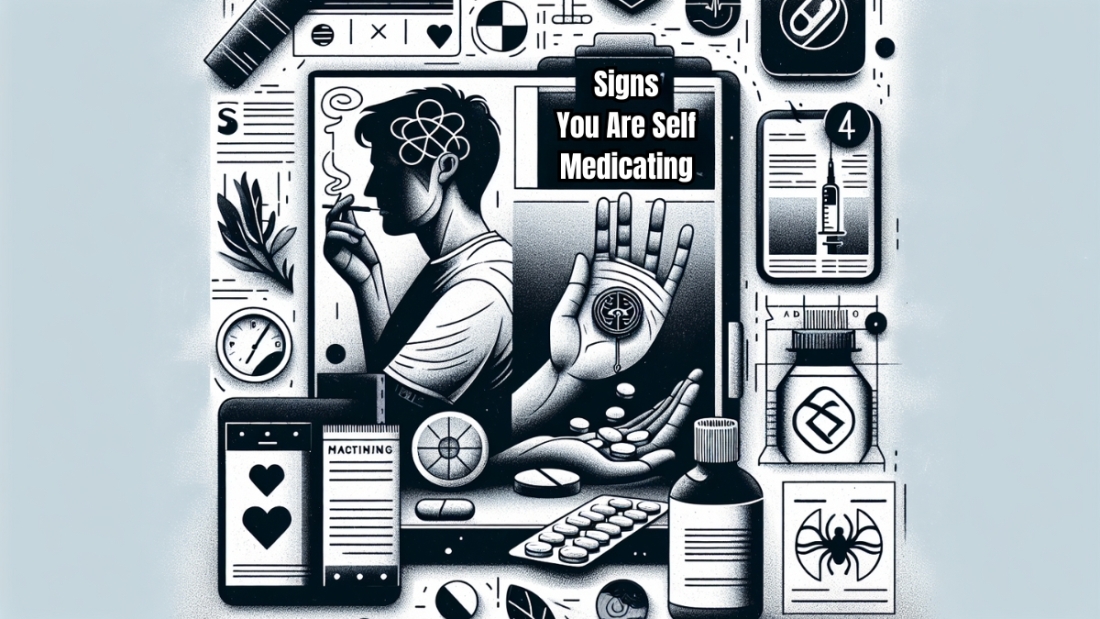Self-medicating refers to the practice of using drugs, alcohol, or other substances to manage mental or emotional issues. While it may provide temporary relief, self-medicating can quickly become a dangerous and ineffective coping mechanism.
Common Signs of Self-Medication
Self-medication can manifest in various ways. One of the most prevalent signs is using substances as a way to escape or numb difficult emotions. Whether it’s reaching for a drink after a tough day or relying on prescription pills to suppress emotional pain, these behaviors can turn into a pattern of self-destructive habits.
Another sign of self-medication is an increasing tolerance to the substance. We all know this, you need larger amounts to experience the same effects. This can be a dangerous cycle, as it can lead to higher doses and potential overdose. Another overwhelming epidemic in our country. Withdrawal symptoms when attempting to quit are another indication of self-medication. If you experience discomfort or cravings when you try to stop using a substance, it may be a sign that you have developed a dependency on it.
Physical Signs of Self-Medication
In addition to the emotional and behavioral signs, self-medication can also have physical manifestations. One common physical sign is changes in weight. Some substances can cause appetite suppression, leading to weight loss, while others may increase appetite, resulting in weight gain.
Another physical sign is changes in sleep patterns. Self-medication can disrupt your body’s natural sleep-wake cycle, leading to insomnia or excessive sleepiness. This can further exacerbate emotional and mental health issues. Furthermore, self-medication can take a toll on your overall physical health. Substance abuse can weaken your immune system, making you more susceptible to illnesses. It can also cause damage to vital organs such as the liver, heart, and brain.
Emotional and Psychological Signs of Self-Medication
Self-medication often stems from underlying emotional or psychological pain. Some signs to look out for include persistent feelings of sadness, anxiety, or irritability. These emotions may become overwhelming, leading you to seek solace in substances. Additionally, self-medication can lead to mood swings. You may find yourself alternating between highs and lows, depending on whether you are under the influence of the substance or experiencing withdrawal symptoms.
Lack of motivation and decreased interest in activities that once brought you joy can also be indicators of self-medication. When substances become the primary focus of your life, other hobbies and interests may fall by the wayside.
Social Signs of Self-Medication
Self-medication can also impact your social life and relationships. One sign to be aware of is isolation. You may start withdrawing from friends and family, preferring the company of substances instead. This can lead to a breakdown in communication and strained relationships.
Another social sign is a decline in performance at work or school. Substance abuse can impair cognitive function, making it difficult to concentrate and perform at your best. This can have long-term consequences on your career and education. Furthermore, self-medication can lead to financial difficulties. The cost of sustaining a substance abuse habit can quickly add up, leaving you struggling to meet your financial obligations.
Risks and Dangers of Self-Medication
Self-medication comes with numerous risks and dangers. One of the most significant dangers is the potential for addiction. What may start as self-medicating can quickly spiral into a full-blown substance abuse disorder, making it even more challenging to break free from the cycle.
Substance abuse also increases the risk of physical health problems. Chronic use can lead to organ damage, cardiovascular issues, and respiratory problems. It can also increase the likelihood of accidents and injuries, as substances impair coordination and judgment. Additionally, self-medication can worsen underlying mental health conditions. Substance abuse can exacerbate symptoms of depression, anxiety, and other psychiatric disorders, making it harder to manage these conditions effectively.
Seeking Professional Help for Self-Medication
If you find it challenging to stop self-medicating on your own, seeking professional help is crucial. Mental health professionals, such as therapists, counselors, or psychiatrists, can provide expert guidance and support. They can assess your specific situation, recommend appropriate treatment options, and help you develop a personalized plan for recovery.
Additionally, medical professionals can assist in managing any withdrawal symptoms or physical health issues that may arise during the recovery process. They can also prescribe medications, if necessary, to support your mental health and aid in the cessation of substance use.
Support Groups and Resources
In addition to professional help, support groups can be an invaluable resource for individuals struggling with self-medication. These groups provide a safe and non-judgmental space for individuals to share their experiences, gain support, and learn from others who have overcome similar challenges. Organizations such as Alcoholics Anonymous (AA), Narcotics Anonymous (NA), and SMART Recovery offer support group meetings both in-person and online. These groups follow a 12-step program or other evidence-based approaches to recovery, providing a structured framework for healing and growth.
There Is A Better Route
Self-medication is a common but harmful coping mechanism that can have severe consequences on your physical, emotional, and social well-being. Recognizing the signs of self-medication is the first step towards breaking free from this cycle. Remember, you don’t have to face these challenges alone. Seeking professional help, building a support system, and exploring healthier coping mechanisms can empower you to overcome self-medication and lead a fulfilling life. Recovery is possible, and by taking the necessary steps, you can embark on a journey towards physical and emotional well-being.



Leave A Comment